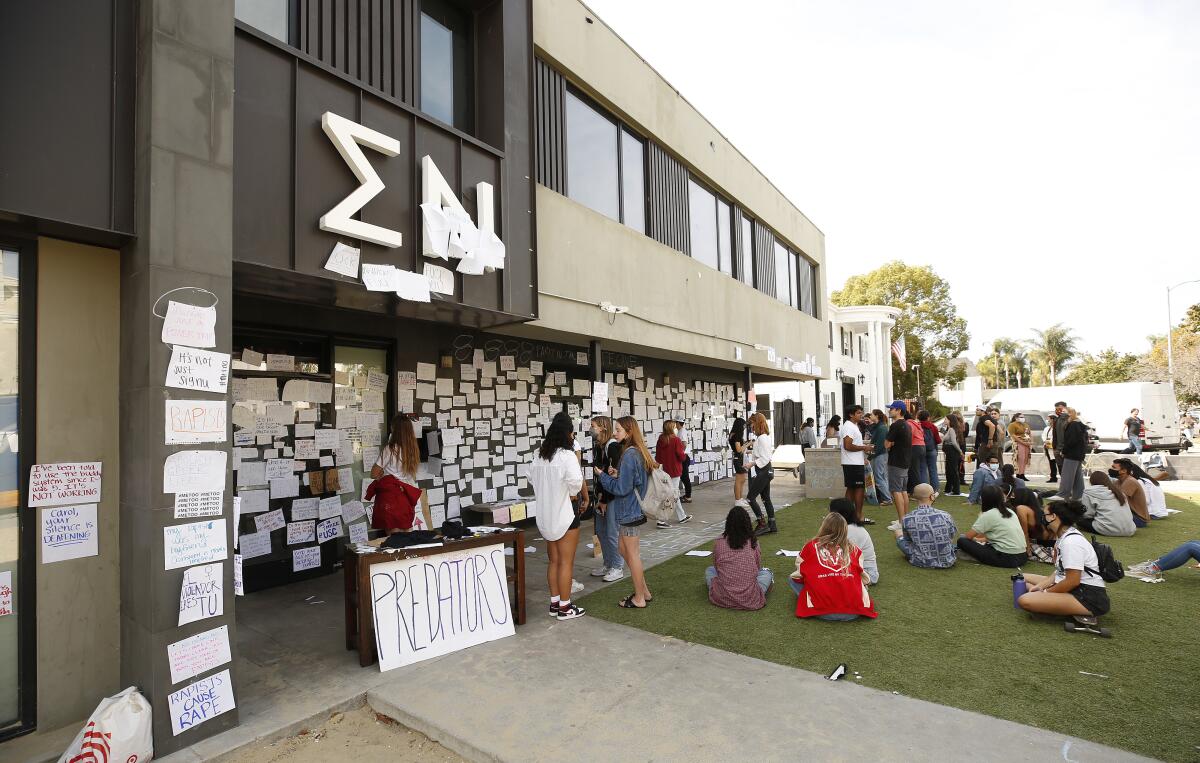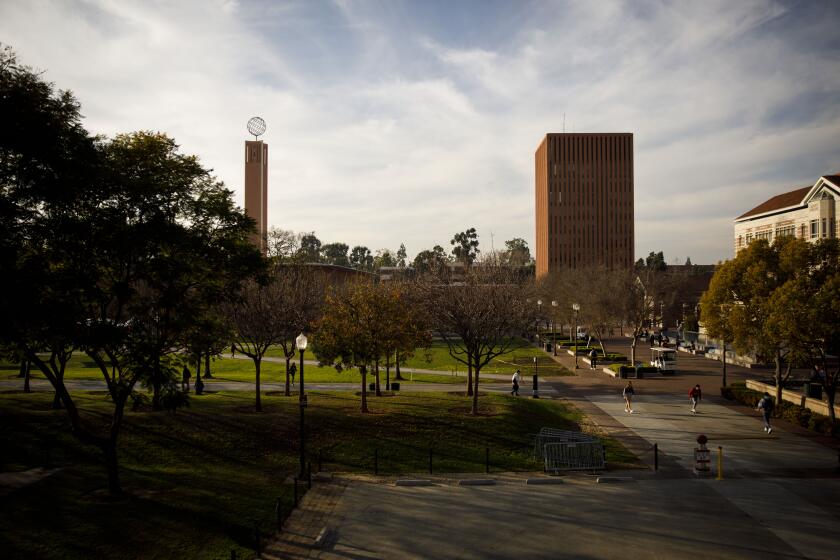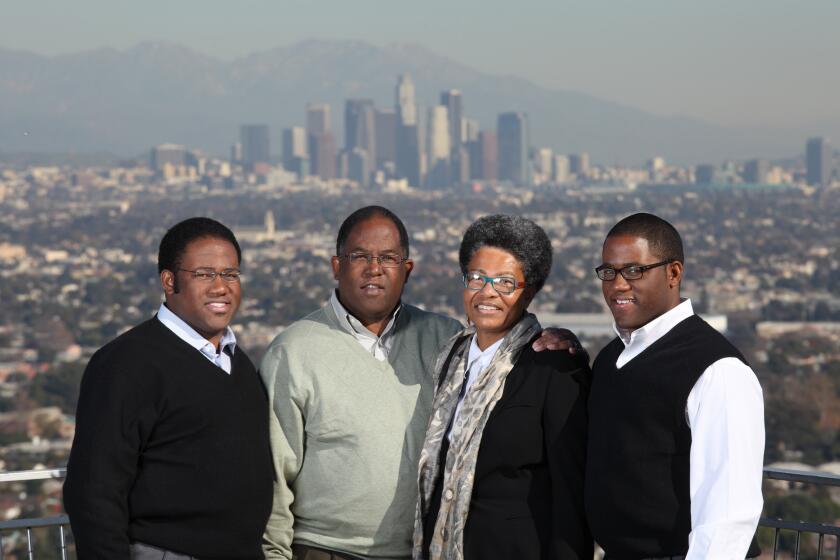Op-Ed: As a USC professor, I can’t stay quiet about the administration’s toxic culture

- Share via
Last week, scandal broke at USC — again. This time, it was allegations of drugging and sexual assault at the Sigma Nu fraternity house that the administration knew about for almost a month before warning other potential victims. During that long silence, another student reported another assault there.
If this sounds familiar, it should. In 2018, under the presidency of C.L. Max Nikias, the Los Angeles Times broke the story that George Tyndall, a gynecologist at the Student Health Center, was accused of assaulting female students for three decades, despite numerous complaints from students and nurses, and despite an investigation by USC’s Title IX office that found “there was no ‘there’ there.” USC let the doctor continue to treat students. Accusations continued to grow.
For the record:
7:13 p.m. Nov. 3, 2021An earlier version of this article incorrectly stated that McKinsey & Co. built immigrant detention facilities and Uyghur concentration camps. Its work for Immigration and Customs Enforcement involved recommending ways to cut costs at deportation facilities and speed up deportations.
The university eventually gave him a severance package and allowed him to leave quietly. Officials failed for years to alert medical authorities, police or prosecutors, nor did they inform USC students or former patients. The USC administration actually appeared not to want to know the truth.
How did a doctor remain employed at the Student Health Center for 30 years as accusations grew? Why has only the physician faced charges?
But, you might ask, wasn’t the ship righted, after that? In the days after the L.A. Times story broke in May 2018, a group of 200 faculty members signed a letter demanding that Nikias step down. (I drafted the letter with a small group of my colleagues.) The next day, the board of trustees announced that it had hired a prestigious law firm to investigate the fiasco and that its report would be made public. Nikias resigned at the end of the summer.
The board also promised to make public the reports of investigations of earlier administrative failures, notably the case four years ago of a medical school dean who had been addicted to methamphetamine and other drugs and had almost let his young girlfriend die in a hotel room of a drug overdose.
The stories of how Song Girls, a group of dancers on the spirit team, were publicly humiliated cap a long, maddening USC story of image over substance
Perhaps you won’t be surprised to learn that reports about those allegations have not been made public. What’s more, several of the administration officials intimately involved in the moral and administrative failures remained on the job for more than a year.
Meanwhile, a new administration took over USC, but President Carol Folt and Provost Charles “Chip” Zukoski kept up the pattern of secrecy and denial in handling fallout from a series of cases: the involvement of several USC officials in an admissions cheating scam, the School of Social Work dean indicted for allegedly paying bribes to secure millions of dollars in Los Angeles County contracts, and a Student Health Center doctor accused of assaulting young men. In each case, the fallout and costs will affect the USC faculty, staff and students for decades to come.
To say USC has had a dramatic couple of years would be an understatement.
I hate the word “scandal,” because it connotes something slightly salacious and even sexy. The truth is that the ethical failures of the USC administration, including the coverups, have been tragic, not sexy.
Yet this administration continues to cover up rather than come clean. The USC community needs the campus leaders to forthrightly admit mistakes, investigate failures and make known the results of those investigations. Instead, we get distractions and euphemisms.
The noted ethical experts McKinsey & Co. have been on campus for two years advising the president on improving USC’s “culture,” among other things. Yes, you read that right: the consultants known for their role in the opioid crisis and immigrant detention facilities, and for involvement with Enron. And the centerpiece of this effort, called USC’s “Culture Journey,” consisted of surveys and focus groups to generate six phrases to articulate USC’s “values,” after which the university is hosting panels to talk about these values.
How to think about people who behave illegally not for themselves but for their children.
Those surveys and focus groups revealed that many constituencies on campus, especially tenured faculty, felt alienated and outraged by failures of integrity and ethics, lack of openness and imperial decision making from the very top. But the administration has persisted in treating its problems as broad cultural ones for which others are responsible.
In the meantime, USC has failed to fulfill even the minimal commitment it made as a result of the legal settlement it reached with some of Tyndall’s accusers and a separate settlement with the U.S. Department of Education’s Civil Rights Division. Both settlements required USC to agree to a series of best practices to reform its sexual assault prevention protocols on campus. The university dragged its feet and has implemented only a few thus far.
The new administration — no longer new — could have used this crisis as an opportunity. Even if it wanted to bury the past, it could have prepared for a better future by embracing reforms to make USC a standout campus with regard to sexual assault and prevention. Instead, we don’t even have a place where survivors can go after an assault for evidence collection with a rape kit. They have to drive to Santa Monica instead.
That brings us to Sigma Nu. Members of the USC community found out about the alleged rapes at the fraternity through a daily “crime alert” email from the Department of Public Safety on Oct. 21, weeks after administration officials had been alerted. When the L.A. Times highlighted that disclosure and reported on the allegations, and after students began to protest, the provost sent a letter to faculty and staff warning us not to “make assumptions” about “organizations that use Greek letters in their names” or “live in the same area or residence where events may have occurred.” Instead, he asked faculty and staff to take responsibility for supporting our students in the face of sexual assault and violence. Again, euphemism and denial are the order of the day.
My students, faculty and staff colleagues are some of the best, most hard-working and most ethical people I have ever known. Indeed, one of the silver linings for me of my involvement in protesting the university administration’s actions over the last few years as the chair of Concerned Faculty of USC has been getting to know them better. But the culture of the USC administration is rotten from the top. What will it take for that to change?
Ariela J. Gross is a professor of law and history at USC.
More to Read
A cure for the common opinion
Get thought-provoking perspectives with our weekly newsletter.
You may occasionally receive promotional content from the Los Angeles Times.












